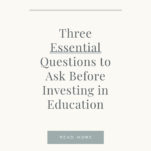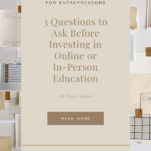Keep Reading
Avoid Buyers Remorse! Three essential questions to ask before investing in education
If your social media feeds look anything like mine these days, you’re seeing new education opportunities scrolling across your feed on the daily. From online curriculum to in-person experiences, how do you sift through all the things and choose the right education experiences for you? As a finance gal myself I’m a big believer in […]

Paragraph
If your social media feeds look anything like mine these days, you’re seeing new education opportunities scrolling across your feed on the daily. From online curriculum to in-person experiences, how do you sift through all the things and choose the right education experiences for you?
As a finance gal myself I’m a big believer in ROI (aka return on investment) so I hope these quick tips help you not only choose the right education for you and your unique needs, but also to have your pennies saved up next time one of those can’t-live-without education opportunities comes across your news feed!
Three essential questions to ask before investing in education (either online or in person)
1. What do I hope to get out of this?
I think it’s essential for you to know the exact outcome hoped for in order to determine the right education to invest in! For instance, if you’re hoping to gain community then an online education experience might not be the right way to go, but choosing an in-person opportunity would be better based on your goals! If on the other hand you are hoping to learn a new skill (like money management ?) then an online opportunity could be the perfect fit so that you can re-watch the curriculum as much as needed until it sinks in! Knowing the one most important outcome you hope to get out of the education will help ensure you’re making the right investment!
2. Why should I learn from this person or attend this event?
Several years ago, I watched an old Youtube clip from an interview with Steve Jobs. He foretold about a day when big businesses and small business will appear the same online. It’s been years since I’ve watched that video and that still sticks out to me. Yep! He called it. The Internet has given many of us (me included!) the opportunity to have a business working from home, what a cool opportunity! Sadly, that blessing does have a dark side as it can be hard to decipher the “real behind the highlight reel!” While I believe most educators have really good hearts and genuinely want to help others, that doesn’t mean every teacher or educational opportunity is right for you. So it’s up to you to do your research! Really look at the educator. Why do you want to learn from them? What education, experience, and track-record do they have? Also, ask for referrals and contact them before buying!
3. How will I make back this investment 3xs in my business?
That’s right! For every dollar you spend on education, I want you to see that return $3+ in your business. So if you intend to invest $2,000 on an in-person retreat … what would you need to take away from that event to return $6,000-$8,000 in your business? Do you need to meet one new business contact? Do you want to build a relationship with that speaker and collaborate on a future project? Same with an online course. If you’re investing $200 online, how will that course make your business $600-$800 in the future? Essentially, what is the return on investment? I know sometimes the return isn’t as tangible … building relationships might have an emotional return that cannot be measured in dollars. But, I always want you to keep the ROI in mind. Don’t just invest for investing sake or in the hype of the sale. Invest with intentional growth in mind.
These 3 tips will make sure you’re investing in the right education.
—
Bonus! How to budget for educational experiences
Well, you may not like my answer here, but the answer is right there in the question! Create a budget for them *wink*! Each year before starting a new year I create a budget (I call this a spending plan) for my business (aka I put a dollar amount earmarked for continuing education as a line item on my financial plan). That all sounds super fancy but here’s a quick way to get started. How much did you sell last year in total? Take 5% (multiply total sales x .05) to calculate your education budget for the year! I recommend spending no more than 5-10% of your total sales on continuing education. If it’s your first year in business you won’t have a sales number to review, but you can base your education budget off the amount you plan to sell that year.
Real life example : $20,000 in sales would equal a $1,000-$2,000 budget for education. ($20,000 x .05 = $1,000)
Going into the year with a plan will help you weigh your education options carefully (using the three questions above) and decrease buyers remorse from purchases made in haste.
—
Cheers to continued learning with the right people at the right time! I hope these tips help in your next education buying decision!
xx,
Shanna
Want to dive deeper?
- Learn more about my online business & finance curriculum → Click here to Shop The Blueprint Collection!
- Stay in the loop for upcoming trainings, events and business content by joining my newsletter.
*Want to save this to read later? Click the red button below to Pin it 
February 16, 2021
Previous Post:
Next Post:



And if you found this helpful, share with your friends!